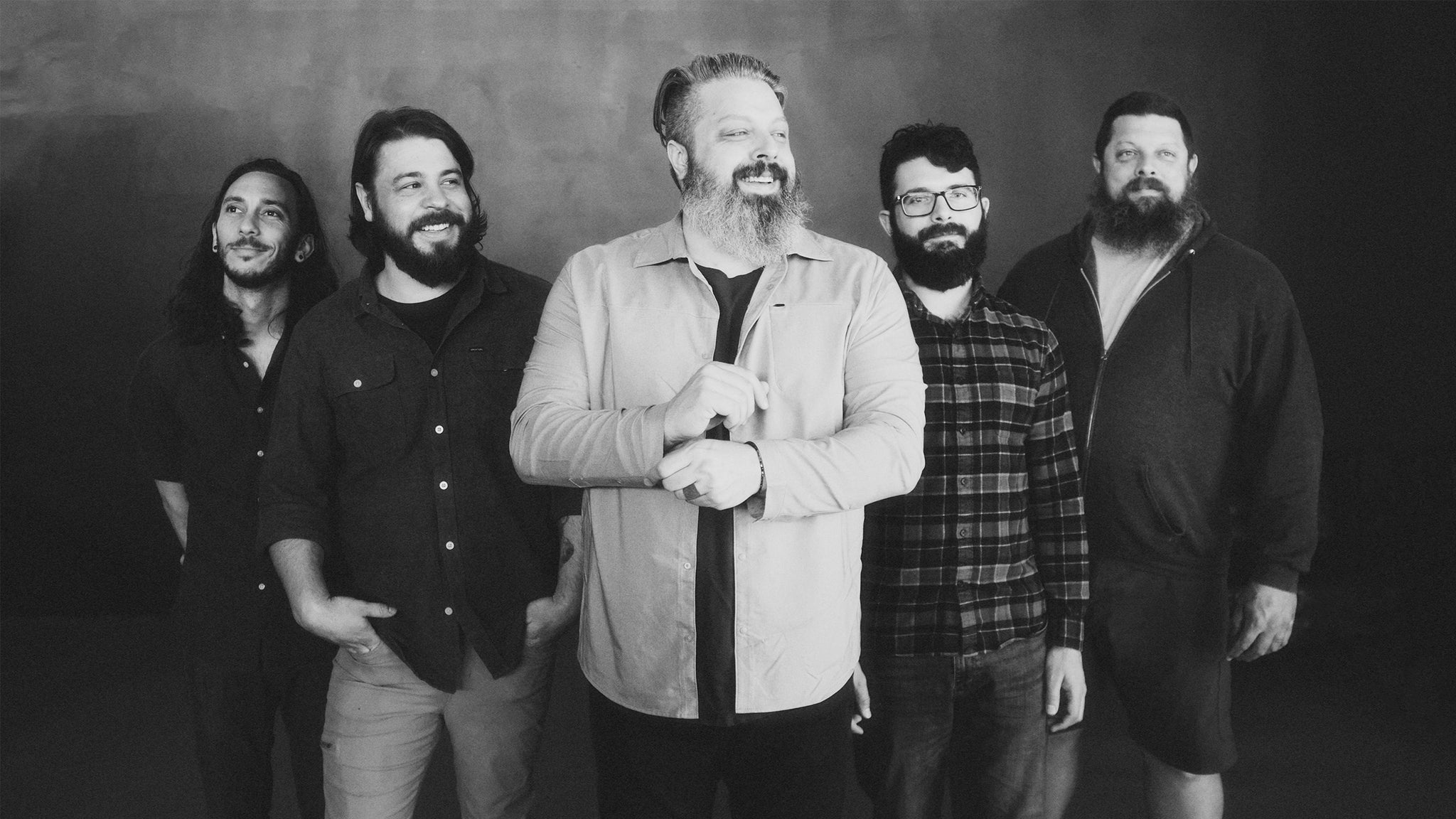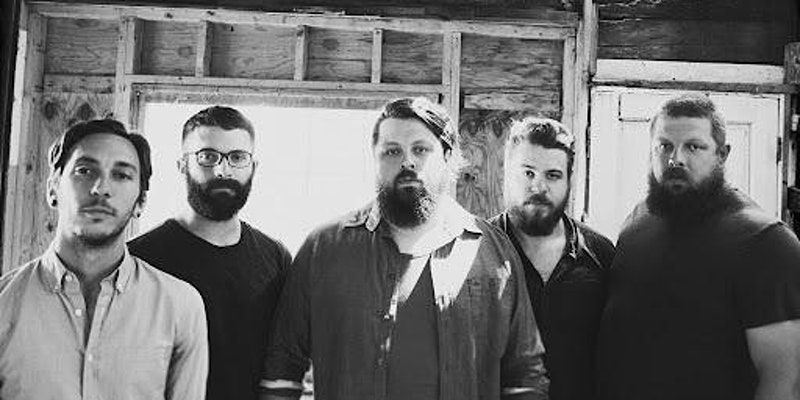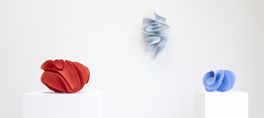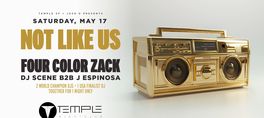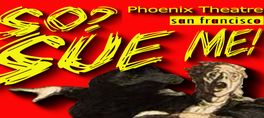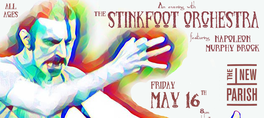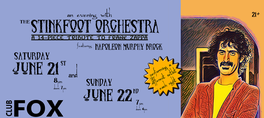Sometimes, it takes a while to find your way home, wherever "home" may be. But when you do, it's nothing short of glorious. And that, in a nutshell, is the story of The Dear Hunter's new album, "Migrant."
Casey Crescenzo, mastermind of The Dear Hunter, was born into music. His parents met while both were working at the Record Plant recording studio in Sausalito, California, where Stevie Wonder recorded "Songs in the Key of Life" and Rick James recorded "Super Freak." He started learning to play guitar when he was eight, using his mom's '64 Harmony Bobcat ("basically a piece of cardboard with a tin foil pickup and strings," he recalls), and from the ages of nine through 14 he pretty much listened to nothing but Jimi Hendrix. He broke his left arm in the seventh grade in a basketball-dunking stunt gone awry, and spent the summer playing guitar with a cast on. When the cast finally came off, he found he was able to play far better than before, thanks to the months of resistance, and he started playing along with Steve Vai and Frank Zappa records in his room.
Toward the end of high school, Casey joined a band called Dillusion, on guitar -- at that time, he recalls, "it seemed like every band in Southern California was a nu metal band." They signed a development deal with Epic Records, but after co-producing an EP for the band, Casey ultimately decided it wasn't a good musical fit for him, and left the group.
Pessimistic about his future in music, he sold all of his musical equipment and moved across the country, living briefly in New York's Hudson Valley before moving to Boston. But a number of job opportunities in film editing and computer graphics fell through, and he ended up living in the apartment as a recluse for three months before he was evicted, and wound up homeless on the streets of Boston for several months. (He never told his parents, talking his way around the fact whenever they spoke.)
He finally found an apartment, living with three girls who didn't require a credit check (a vital requirement, as Casey had no credit to check). One of them worked at a local Urban Outfitters store, and got Casey a job as a cashier. And after a couple of months, Casey found his way back to writing music again. A couple of his co-workers at the store had a band, and word got to Casey that they were looking for a singer. He was hesitant, as he'd never been a frontman before, but he gave them a demo tape anyway, and they liked his guitar playing and synthesizer/sequencing skills, so, although his voice was too mellow, they wanted him to join.
That band was The Receiving End of Sirens. They quickly released an EP, and a year after Casey joined the band, they released their debut album on Triple Crown Records. The band hit the road as soon as the album came out, and stayed there for a year solid, supporting a variety of other punk and hardcore bands across the country and joining the Vans Warped Tour for a stint in 2005.
It was Casey's first taste of musical success, but he was exhausted. In the previous three years he'd gone from heartbroken and homeless to life on the road, sleeping on couches and floors, and putting in a ton of work on top of playing in the band: building their website, handling their merchandise, directing and editing music videos, and recording all their demos. He felt intensely creative (and the band didn't have any money to hire other people to handle these things anyway), and so he relished the work, but he was running himself ragged. He grew sick, and with no time to rest, no health insurance, and no money to pay a hospital bill, it got worse and worse, and his demeanor soured accordingly. By the end of the band's first headlining tour in the spring of 2006, he was out of gas, alienated from his bandmates, and was sure he was about to get kicked out of the band. The others assured him this wasn't so, he just needed to rest for a while, and packed him off to his parents' house in California... where he arrived to an email from his bandmates, telling him he was out.
But what seemed like the tragic end of yet another road for Casey turned out to be the best thing that could have happened. He'd been writing and recording songs on his own, on the side, just for fun, and labeling it The Dear Hunter; and the day after The Receiving End of Sirens kicked him out, both his booking agent and the head of his label called and said, "You should do The Dear Hunter for real, and we want in."
Ten EPs, three albums, five home bases and about a hundred band members later, The Dear Hunter has allowed Casey Crescenzo to realize his musical vision. From the beginning, it was a high-concept project: Casey mapped out multi-page treatments for a six-album story arc set at the dawn of the 20th century about the birth, life, and abrupt death of a boy, known only in the story as "The Dear Hunter." Within a year he'd released the full-length albums "Act I: The Lake South, The River North" and "Act II: The Meaning of, and All Things Regarding Ms. Leading." The third installment, "Act III: Life and Death," came two years later. Then, in 2010 and 2011, he took a break from the Acts to record "The Color Spectrum," a series of nine EPs, each named for a color of the rainbow (along with black and white) and featuring songs intended as musical interpretations of that color. The stylistic range on "The Color Spectrum" was expansive, from the intricate prog-metal pathos of "This Body" to the majestic, uplifting pop of "Home." Casey played a special show at Boston's Somerville Theatre at which he performed all 36 songs from "The Color Spectrum" live, with full band and string section; a DVD of this one-time event will be released on March 12, 2013.
And now, another sharp turn from The Dear Hunter: "Migrant," out April 2, 2013 on Equal Vision Records. This time, there's no overarching concept to enforce, no elaborate fictions to weave -- just 12 beautiful, honest, patient songs, and certainly Casey Crescenzo's most broadly accessible music ever. And it's staggering to think that this is the same guy whose voice was once deemed "too mellow," as Casey ranges from intimate murmur to smoky falsetto to urgent wail, coloring the songs from out in front. It's obvious from the exhilarating gallop of the first single, "Whisper," and the dusky keys and strings of "Shame" (inspired by the canon of James Bond movie theme songs), that The Dear Hunter has entered another new phase, dealing with universal ideas, sounds, and experiences. It's been a long, hard road to get here, but Casey Crescenzo finally feels at home.
show less
Casey Crescenzo, mastermind of The Dear Hunter, was born into music. His parents met while both were working at the Record Plant recording studio in Sausalito, California, where Stevie Wonder recorded "Songs in the Key of Life" and Rick James recorded "Super Freak." He started learning to play guitar when he was eight, using his mom's '64 Harmony Bobcat ("basically a piece of cardboard with a tin foil pickup and strings," he recalls), and from the ages of nine through 14 he pretty much listened to nothing but Jimi Hendrix. He broke his left arm in the seventh grade in a basketball-dunking stunt gone awry, and spent the summer playing guitar with a cast on. When the cast finally came off, he found he was able to play far better than before, thanks to the months of resistance, and he started playing along with Steve Vai and Frank Zappa records in his room.
Toward the end of high school, Casey joined a band called Dillusion, on guitar -- at that time, he recalls, "it seemed like every band in Southern California was a nu metal band." They signed a development deal with Epic Records, but after co-producing an EP for the band, Casey ultimately decided it wasn't a good musical fit for him, and left the group.
Pessimistic about his future in music, he sold all of his musical equipment and moved across the country, living briefly in New York's Hudson Valley before moving to Boston. But a number of job opportunities in film editing and computer graphics fell through, and he ended up living in the apartment as a recluse for three months before he was evicted, and wound up homeless on the streets of Boston for several months. (He never told his parents, talking his way around the fact whenever they spoke.)
He finally found an apartment, living with three girls who didn't require a credit check (a vital requirement, as Casey had no credit to check). One of them worked at a local Urban Outfitters store, and got Casey a job as a cashier. And after a couple of months, Casey found his way back to writing music again. A couple of his co-workers at the store had a band, and word got to Casey that they were looking for a singer. He was hesitant, as he'd never been a frontman before, but he gave them a demo tape anyway, and they liked his guitar playing and synthesizer/sequencing skills, so, although his voice was too mellow, they wanted him to join.
That band was The Receiving End of Sirens. They quickly released an EP, and a year after Casey joined the band, they released their debut album on Triple Crown Records. The band hit the road as soon as the album came out, and stayed there for a year solid, supporting a variety of other punk and hardcore bands across the country and joining the Vans Warped Tour for a stint in 2005.
It was Casey's first taste of musical success, but he was exhausted. In the previous three years he'd gone from heartbroken and homeless to life on the road, sleeping on couches and floors, and putting in a ton of work on top of playing in the band: building their website, handling their merchandise, directing and editing music videos, and recording all their demos. He felt intensely creative (and the band didn't have any money to hire other people to handle these things anyway), and so he relished the work, but he was running himself ragged. He grew sick, and with no time to rest, no health insurance, and no money to pay a hospital bill, it got worse and worse, and his demeanor soured accordingly. By the end of the band's first headlining tour in the spring of 2006, he was out of gas, alienated from his bandmates, and was sure he was about to get kicked out of the band. The others assured him this wasn't so, he just needed to rest for a while, and packed him off to his parents' house in California... where he arrived to an email from his bandmates, telling him he was out.
But what seemed like the tragic end of yet another road for Casey turned out to be the best thing that could have happened. He'd been writing and recording songs on his own, on the side, just for fun, and labeling it The Dear Hunter; and the day after The Receiving End of Sirens kicked him out, both his booking agent and the head of his label called and said, "You should do The Dear Hunter for real, and we want in."
Ten EPs, three albums, five home bases and about a hundred band members later, The Dear Hunter has allowed Casey Crescenzo to realize his musical vision. From the beginning, it was a high-concept project: Casey mapped out multi-page treatments for a six-album story arc set at the dawn of the 20th century about the birth, life, and abrupt death of a boy, known only in the story as "The Dear Hunter." Within a year he'd released the full-length albums "Act I: The Lake South, The River North" and "Act II: The Meaning of, and All Things Regarding Ms. Leading." The third installment, "Act III: Life and Death," came two years later. Then, in 2010 and 2011, he took a break from the Acts to record "The Color Spectrum," a series of nine EPs, each named for a color of the rainbow (along with black and white) and featuring songs intended as musical interpretations of that color. The stylistic range on "The Color Spectrum" was expansive, from the intricate prog-metal pathos of "This Body" to the majestic, uplifting pop of "Home." Casey played a special show at Boston's Somerville Theatre at which he performed all 36 songs from "The Color Spectrum" live, with full band and string section; a DVD of this one-time event will be released on March 12, 2013.
And now, another sharp turn from The Dear Hunter: "Migrant," out April 2, 2013 on Equal Vision Records. This time, there's no overarching concept to enforce, no elaborate fictions to weave -- just 12 beautiful, honest, patient songs, and certainly Casey Crescenzo's most broadly accessible music ever. And it's staggering to think that this is the same guy whose voice was once deemed "too mellow," as Casey ranges from intimate murmur to smoky falsetto to urgent wail, coloring the songs from out in front. It's obvious from the exhilarating gallop of the first single, "Whisper," and the dusky keys and strings of "Shame" (inspired by the canon of James Bond movie theme songs), that The Dear Hunter has entered another new phase, dealing with universal ideas, sounds, and experiences. It's been a long, hard road to get here, but Casey Crescenzo finally feels at home.
Sometimes, it takes a while to find your way home, wherever "home" may be. But when you do, it's nothing short of glorious. And that, in a nutshell, is the story of The Dear Hunter's new album, "Migrant."
Casey Crescenzo, mastermind of The Dear Hunter, was born into music. His parents met while both were working at the Record Plant recording studio in Sausalito, California, where Stevie Wonder recorded "Songs in the Key of Life" and Rick James recorded "Super Freak." He started learning to play guitar when he was eight, using his mom's '64 Harmony Bobcat ("basically a piece of cardboard with a tin foil pickup and strings," he recalls), and from the ages of nine through 14 he pretty much listened to nothing but Jimi Hendrix. He broke his left arm in the seventh grade in a basketball-dunking stunt gone awry, and spent the summer playing guitar with a cast on. When the cast finally came off, he found he was able to play far better than before, thanks to the months of resistance, and he started playing along with Steve Vai and Frank Zappa records in his room.
Toward the end of high school, Casey joined a band called Dillusion, on guitar -- at that time, he recalls, "it seemed like every band in Southern California was a nu metal band." They signed a development deal with Epic Records, but after co-producing an EP for the band, Casey ultimately decided it wasn't a good musical fit for him, and left the group.
Pessimistic about his future in music, he sold all of his musical equipment and moved across the country, living briefly in New York's Hudson Valley before moving to Boston. But a number of job opportunities in film editing and computer graphics fell through, and he ended up living in the apartment as a recluse for three months before he was evicted, and wound up homeless on the streets of Boston for several months. (He never told his parents, talking his way around the fact whenever they spoke.)
He finally found an apartment, living with three girls who didn't require a credit check (a vital requirement, as Casey had no credit to check). One of them worked at a local Urban Outfitters store, and got Casey a job as a cashier. And after a couple of months, Casey found his way back to writing music again. A couple of his co-workers at the store had a band, and word got to Casey that they were looking for a singer. He was hesitant, as he'd never been a frontman before, but he gave them a demo tape anyway, and they liked his guitar playing and synthesizer/sequencing skills, so, although his voice was too mellow, they wanted him to join.
That band was The Receiving End of Sirens. They quickly released an EP, and a year after Casey joined the band, they released their debut album on Triple Crown Records. The band hit the road as soon as the album came out, and stayed there for a year solid, supporting a variety of other punk and hardcore bands across the country and joining the Vans Warped Tour for a stint in 2005.
It was Casey's first taste of musical success, but he was exhausted. In the previous three years he'd gone from heartbroken and homeless to life on the road, sleeping on couches and floors, and putting in a ton of work on top of playing in the band: building their website, handling their merchandise, directing and editing music videos, and recording all their demos. He felt intensely creative (and the band didn't have any money to hire other people to handle these things anyway), and so he relished the work, but he was running himself ragged. He grew sick, and with no time to rest, no health insurance, and no money to pay a hospital bill, it got worse and worse, and his demeanor soured accordingly. By the end of the band's first headlining tour in the spring of 2006, he was out of gas, alienated from his bandmates, and was sure he was about to get kicked out of the band. The others assured him this wasn't so, he just needed to rest for a while, and packed him off to his parents' house in California... where he arrived to an email from his bandmates, telling him he was out.
But what seemed like the tragic end of yet another road for Casey turned out to be the best thing that could have happened. He'd been writing and recording songs on his own, on the side, just for fun, and labeling it The Dear Hunter; and the day after The Receiving End of Sirens kicked him out, both his booking agent and the head of his label called and said, "You should do The Dear Hunter for real, and we want in."
Ten EPs, three albums, five home bases and about a hundred band members later, The Dear Hunter has allowed Casey Crescenzo to realize his musical vision. From the beginning, it was a high-concept project: Casey mapped out multi-page treatments for a six-album story arc set at the dawn of the 20th century about the birth, life, and abrupt death of a boy, known only in the story as "The Dear Hunter." Within a year he'd released the full-length albums "Act I: The Lake South, The River North" and "Act II: The Meaning of, and All Things Regarding Ms. Leading." The third installment, "Act III: Life and Death," came two years later. Then, in 2010 and 2011, he took a break from the Acts to record "The Color Spectrum," a series of nine EPs, each named for a color of the rainbow (along with black and white) and featuring songs intended as musical interpretations of that color. The stylistic range on "The Color Spectrum" was expansive, from the intricate prog-metal pathos of "This Body" to the majestic, uplifting pop of "Home." Casey played a special show at Boston's Somerville Theatre at which he performed all 36 songs from "The Color Spectrum" live, with full band and string section; a DVD of this one-time event will be released on March 12, 2013.
And now, another sharp turn from The Dear Hunter: "Migrant," out April 2, 2013 on Equal Vision Records. This time, there's no overarching concept to enforce, no elaborate fictions to weave -- just 12 beautiful, honest, patient songs, and certainly Casey Crescenzo's most broadly accessible music ever. And it's staggering to think that this is the same guy whose voice was once deemed "too mellow," as Casey ranges from intimate murmur to smoky falsetto to urgent wail, coloring the songs from out in front. It's obvious from the exhilarating gallop of the first single, "Whisper," and the dusky keys and strings of "Shame" (inspired by the canon of James Bond movie theme songs), that The Dear Hunter has entered another new phase, dealing with universal ideas, sounds, and experiences. It's been a long, hard road to get here, but Casey Crescenzo finally feels at home.
read more
Casey Crescenzo, mastermind of The Dear Hunter, was born into music. His parents met while both were working at the Record Plant recording studio in Sausalito, California, where Stevie Wonder recorded "Songs in the Key of Life" and Rick James recorded "Super Freak." He started learning to play guitar when he was eight, using his mom's '64 Harmony Bobcat ("basically a piece of cardboard with a tin foil pickup and strings," he recalls), and from the ages of nine through 14 he pretty much listened to nothing but Jimi Hendrix. He broke his left arm in the seventh grade in a basketball-dunking stunt gone awry, and spent the summer playing guitar with a cast on. When the cast finally came off, he found he was able to play far better than before, thanks to the months of resistance, and he started playing along with Steve Vai and Frank Zappa records in his room.
Toward the end of high school, Casey joined a band called Dillusion, on guitar -- at that time, he recalls, "it seemed like every band in Southern California was a nu metal band." They signed a development deal with Epic Records, but after co-producing an EP for the band, Casey ultimately decided it wasn't a good musical fit for him, and left the group.
Pessimistic about his future in music, he sold all of his musical equipment and moved across the country, living briefly in New York's Hudson Valley before moving to Boston. But a number of job opportunities in film editing and computer graphics fell through, and he ended up living in the apartment as a recluse for three months before he was evicted, and wound up homeless on the streets of Boston for several months. (He never told his parents, talking his way around the fact whenever they spoke.)
He finally found an apartment, living with three girls who didn't require a credit check (a vital requirement, as Casey had no credit to check). One of them worked at a local Urban Outfitters store, and got Casey a job as a cashier. And after a couple of months, Casey found his way back to writing music again. A couple of his co-workers at the store had a band, and word got to Casey that they were looking for a singer. He was hesitant, as he'd never been a frontman before, but he gave them a demo tape anyway, and they liked his guitar playing and synthesizer/sequencing skills, so, although his voice was too mellow, they wanted him to join.
That band was The Receiving End of Sirens. They quickly released an EP, and a year after Casey joined the band, they released their debut album on Triple Crown Records. The band hit the road as soon as the album came out, and stayed there for a year solid, supporting a variety of other punk and hardcore bands across the country and joining the Vans Warped Tour for a stint in 2005.
It was Casey's first taste of musical success, but he was exhausted. In the previous three years he'd gone from heartbroken and homeless to life on the road, sleeping on couches and floors, and putting in a ton of work on top of playing in the band: building their website, handling their merchandise, directing and editing music videos, and recording all their demos. He felt intensely creative (and the band didn't have any money to hire other people to handle these things anyway), and so he relished the work, but he was running himself ragged. He grew sick, and with no time to rest, no health insurance, and no money to pay a hospital bill, it got worse and worse, and his demeanor soured accordingly. By the end of the band's first headlining tour in the spring of 2006, he was out of gas, alienated from his bandmates, and was sure he was about to get kicked out of the band. The others assured him this wasn't so, he just needed to rest for a while, and packed him off to his parents' house in California... where he arrived to an email from his bandmates, telling him he was out.
But what seemed like the tragic end of yet another road for Casey turned out to be the best thing that could have happened. He'd been writing and recording songs on his own, on the side, just for fun, and labeling it The Dear Hunter; and the day after The Receiving End of Sirens kicked him out, both his booking agent and the head of his label called and said, "You should do The Dear Hunter for real, and we want in."
Ten EPs, three albums, five home bases and about a hundred band members later, The Dear Hunter has allowed Casey Crescenzo to realize his musical vision. From the beginning, it was a high-concept project: Casey mapped out multi-page treatments for a six-album story arc set at the dawn of the 20th century about the birth, life, and abrupt death of a boy, known only in the story as "The Dear Hunter." Within a year he'd released the full-length albums "Act I: The Lake South, The River North" and "Act II: The Meaning of, and All Things Regarding Ms. Leading." The third installment, "Act III: Life and Death," came two years later. Then, in 2010 and 2011, he took a break from the Acts to record "The Color Spectrum," a series of nine EPs, each named for a color of the rainbow (along with black and white) and featuring songs intended as musical interpretations of that color. The stylistic range on "The Color Spectrum" was expansive, from the intricate prog-metal pathos of "This Body" to the majestic, uplifting pop of "Home." Casey played a special show at Boston's Somerville Theatre at which he performed all 36 songs from "The Color Spectrum" live, with full band and string section; a DVD of this one-time event will be released on March 12, 2013.
And now, another sharp turn from The Dear Hunter: "Migrant," out April 2, 2013 on Equal Vision Records. This time, there's no overarching concept to enforce, no elaborate fictions to weave -- just 12 beautiful, honest, patient songs, and certainly Casey Crescenzo's most broadly accessible music ever. And it's staggering to think that this is the same guy whose voice was once deemed "too mellow," as Casey ranges from intimate murmur to smoky falsetto to urgent wail, coloring the songs from out in front. It's obvious from the exhilarating gallop of the first single, "Whisper," and the dusky keys and strings of "Shame" (inspired by the canon of James Bond movie theme songs), that The Dear Hunter has entered another new phase, dealing with universal ideas, sounds, and experiences. It's been a long, hard road to get here, but Casey Crescenzo finally feels at home.
show less
Date/Times:
The Fillmore
20 Upcoming Events
1805 Geary Blvd, San Francisco, CA 94115
The Best Events
Every Week in Your Inbox
From Our Sponsors
UPCOMING EVENTS
Great suggestion! We'll be in touch.
Event reviewed successfully.
